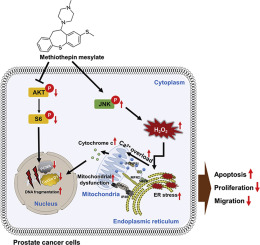当前位置:
X-MOL 学术
›
Free Radical Bio. Med.
›
论文详情
Our official English website, www.x-mol.net, welcomes your feedback! (Note: you will need to create a separate account there.)
Methiothepin mesylate causes apoptosis of human prostate cancer cells by mediating oxidative stress and mitochondrial dysfunction.
Free Radical Biology and Medicine ( IF 7.4 ) Pub Date : 2020-02-05 , DOI: 10.1016/j.freeradbiomed.2020.01.187 Changwon Yang 1 , Gwonhwa Song 1 , Whasun Lim 2
Free Radical Biology and Medicine ( IF 7.4 ) Pub Date : 2020-02-05 , DOI: 10.1016/j.freeradbiomed.2020.01.187 Changwon Yang 1 , Gwonhwa Song 1 , Whasun Lim 2
Affiliation

|
Prostate cancer is difficult to treat if it metastasizes to other organs. The development of prostate cancer independent of androgen is closely related to the action of neuroendocrine products. Serotonin promotes cell growth in various cancers, and antagonists for serotonin receptors are known to inhibit proliferation and induce cell death in various carcinomas. However, little is known about how antagonists for serotonin receptor function in prostate cancer. We verified apoptotic cell death in prostate cancer cell lines after treatment with methiothepin mesylate (MET), an antagonist for serotonin receptor 5-HT1. MET induced hydrogen peroxide (H2O2) production and mitochondrial Ca2+ overload. Moreover, MET induced changes in the expression of proteins associated with endoplasmic reticulum stress, autophagy, and mitochondrial membrane potential. MET also promoted phosphorylation of JNK, which induced cell death mediated by oxidant production, as evidenced by the JNK inhibitor and oxidant scavenger. Finally, MET has the potential to prevent metastasis by inhibiting the migration of prostate cancer cells. Thus, we show that MET is a potentially novel anticancer agent that can suppress the development of prostate cancer caused by neuroendocrine differentiation.
中文翻译:

甲磺酸美托西平通过介导氧化应激和线粒体功能障碍导致人类前列腺癌细胞凋亡。
如果前列腺癌转移到其他器官,则很难治疗。独立于雄激素的前列腺癌的发展与神经内分泌产物的作用密切相关。5-羟色胺促进各种癌症中的细胞生长,并且已知5-羟色胺受体的拮抗剂可抑制多种癌症中的增殖并诱导细胞死亡。然而,关于5-羟色胺受体拮抗剂在前列腺癌中如何发挥作用还知之甚少。我们验证了甲磺酸美托西平(MET),5-羟色胺受体5-HT1的拮抗剂治疗后前列腺癌细胞系中的凋亡细胞死亡。MET引起过氧化氢(H2O2)产生和线粒体Ca2 +超载。而且,MET诱导了与内质网应激,自噬和线粒体膜电位相关的蛋白质表达的变化。MET还促进了JNK的磷酸化,从而诱导了由氧化剂产生介导的细胞死亡,如JNK抑制剂和氧化剂清除剂所证明的。最后,MET具有通过抑制前列腺癌细胞迁移来预防转移的潜力。因此,我们表明MET是一种潜在的新型抗癌药,可以抑制神经内分泌分化引起的前列腺癌的发展。
更新日期:2020-02-06
中文翻译:

甲磺酸美托西平通过介导氧化应激和线粒体功能障碍导致人类前列腺癌细胞凋亡。
如果前列腺癌转移到其他器官,则很难治疗。独立于雄激素的前列腺癌的发展与神经内分泌产物的作用密切相关。5-羟色胺促进各种癌症中的细胞生长,并且已知5-羟色胺受体的拮抗剂可抑制多种癌症中的增殖并诱导细胞死亡。然而,关于5-羟色胺受体拮抗剂在前列腺癌中如何发挥作用还知之甚少。我们验证了甲磺酸美托西平(MET),5-羟色胺受体5-HT1的拮抗剂治疗后前列腺癌细胞系中的凋亡细胞死亡。MET引起过氧化氢(H2O2)产生和线粒体Ca2 +超载。而且,MET诱导了与内质网应激,自噬和线粒体膜电位相关的蛋白质表达的变化。MET还促进了JNK的磷酸化,从而诱导了由氧化剂产生介导的细胞死亡,如JNK抑制剂和氧化剂清除剂所证明的。最后,MET具有通过抑制前列腺癌细胞迁移来预防转移的潜力。因此,我们表明MET是一种潜在的新型抗癌药,可以抑制神经内分泌分化引起的前列腺癌的发展。



























 京公网安备 11010802027423号
京公网安备 11010802027423号